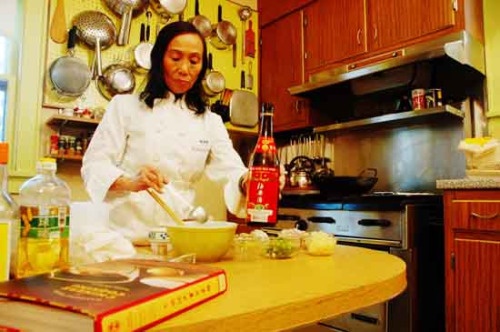Ask a successful male of a certain age to cite a role model who taught him the value of preparation, discipline and plain ol’ hard work during adolescence, and chances are he’ll name a grizzled American archetype like a football coach.
For me, it was a petite Chinese chef named Eileen Yin-Fei Lo.

When I was growing up, my parents were good friends with a successful couple: Fred Ferretti, a former investigative reporter who had become a food critic for The New York Times, and Eileen Yin-Fei Lo, a world-class chef. She’d written books about the art of Chinese cooking and taught at various culinary institutes.
As it happened, Eileen was conducting private classes out of her home in Montclair, New Jersey. When I was a teenager I had a flair for cooking. My mom asked Eileen if she would be willing to take on a teenage boy as a project. Next thing I knew, I was part of a select group. Our class consisted of several middle-aged, married women — and me.
It was one of the best learning environments I could have asked for.
An experience to savor
The key to Eileen’s success wasn’t her “cooking” per se. It was the enormous amount of research she devoted to each recipe. She tried to determine what it was in a particular province or region that made a recipe unique. What influences came from that area’s culture and the society? Why was a dish one style in a particular area and a different style somewhere else?
Eileen talked about that a lot when we were doing the incredibly detailed prep. In the process, she made me realize just how important that step was. Precise, thorough preparation was about 85% of what made a dish successful. Literally, that was the math — we would do an hour and a half of prep for 15 minutes of actual “cooking.”
In hindsight, I realize what terrific real-world experience that was. Preparation is about 85% of anything, whether it’s learning a trade or researching a business opportunity. You need to carefully plan each move.
Sure, circumstances sometimes force you to improvise. I recall Eileen’s story about the time she went to pick up rice wine for a dish, but the liquor store wouldn’t sell it to her because she forgot her ID. So she raided the liquor cabinet at home and substituted some of Fred’s gin for the rice wine. It’s now a permanent ingredient in her recipe for barbeque sparerib marinade. (Maybe someday someone teaching a cooking class will discuss that tweak as a regional interest point, too.)
In general, though, precision pays off. The details matter in any deal, for the same reason that the size of the pieces matters when you’re dicing ingredients while preparing a dish. Every ingredient has to be perfect, set up and ready to go. Because once that wok is up to a smoking temperature — that is to say, once you’re ready to burn money — you have to cook the ingredients in a very specific order and then combine them at just the right time. If you don’t have everything ready, something will cook too long or be substandard in some way.
Much of the class was devoted to reinforcing that principle. You had to think each dish through and have the steps organized and all the ingredients in the proper sequence before you could make it and serve it — or “bring it to market,” so to speak.
The secret ingredient is…
When I look at my career in tech, those lessons I learned from Eileen Yin-Fei Lo hold true. The more you have everything thought through before you start building, the more successful you’ll be. That means having a detailed plan and combining it with the right people and the right assets — capital, technology, things like that. Then when it’s time to start building, it’s a simple matter of putting together pieces that are all just sitting there, made to fit according to a specific blueprint.
Really, that’s all it comes down to. If there’s a “secret ingredient” that’s helped me succeed at organizing a business in tech, it was a Chinese chef who taught me that lesson more than 30 years ago.

 Chairman and Founder at PebblePost, former VC in adtech, long-time endurance athlete, happy dad to “The Heathens.”
Chairman and Founder at PebblePost, former VC in adtech, long-time endurance athlete, happy dad to “The Heathens.”